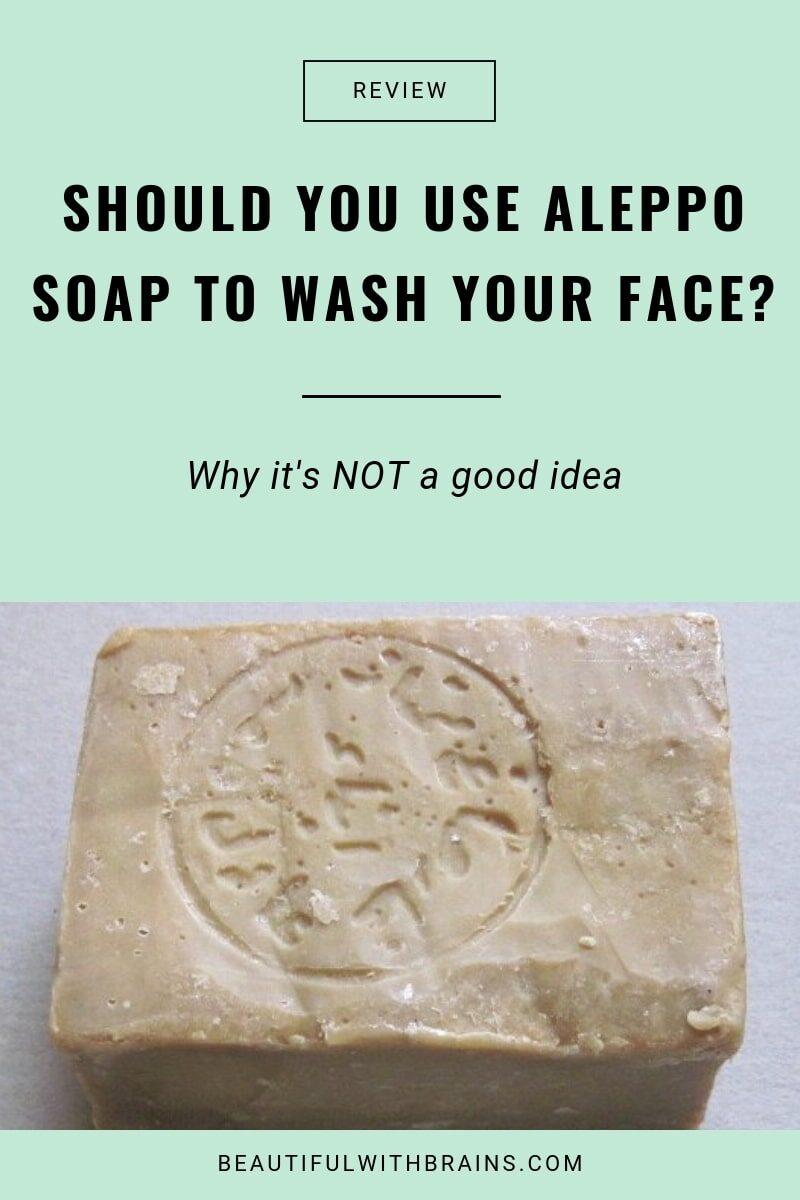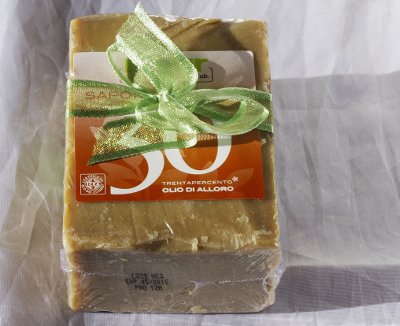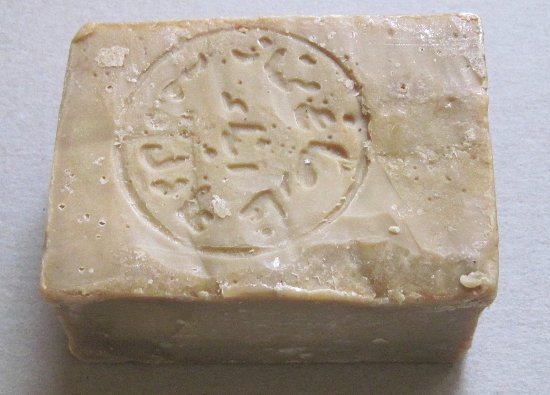
NOTE: I’m not sure this brand is available anymore. But a lot of other Aleppo soap formulas are pretty much the same, so a lot of what’s in this review (especially the ingredient section) still applies.
I keep hearing raves about Aleppo soap. It’s an ancient type of soap from Syria made mostly of olive oil and a variable amount of laurel oil (the one I have contains 30% of it).
To say that I was excited to finally try it would be an understatement. Unfortunately, the excitement died quickly. Nour Aleppo Soap with 30% Laurel Oil is, hands down, the worst soap I have ever used. Here’s why:
P.S. It doesn’t matter if you’re using a different brand. The ingredients are the same, so the review still applies.
- What’s In Nour Aleppo Soap With 30% Laurel Oil?
- Texture
- Fragrance
- How To Use It
- Packaging
- Performance & Personal Opinion
- What I Like About Aleppo Soap
- What I DON’T Like About Aleppo Soap
- Who Should Use This?
- Does Nour Aleppo Soap with 30% Laurel Oil Live Up To Its Claims?
- Price & Availability
- Do You Need It?
- Dupes & Alternatives
What’s In Nour Aleppo Soap With 30% Laurel Oil?
OLIVE OIL
Oils in skincare do double duty – and the olive oil in Nour Aleppo Soap With 30% Laurel Oil is no exception:
- Cleansing: Olive oil works thanks to the “like attracts like” principle. The oil attaches to the oils in your makeup + skin, melting them away.
- Moisturising: Olive oil is rich in fatty acids that strengthen the skin’s protective barrier, helping to keep it soft and smooth for hours.
If this were the only oil in the soap, it wouldn’t be so harsh…
Related: 4 Skincare Uses For Olive Oil
LAUREL OIL
Ok, I’m sure Nour didn’t add laurel oil to their Aleppo Soap with 30% Laurel Oil to ruin your skin. But that’s what it did to me…
In theory, laurel oil has moisturising and anti-aging properties. In practice, natural oils aren’t just one ingredient. If you were to dissect laurel oil, you’ll discover it’s made of lots of ingredients.
Most of them are harmless. Others, not so much. I’m talking about its fragrant components, the compound that give the plant its distinctive smell. They’re a common allergen and often cause irritations.
If your skin’s sensitive, avoid this stuff like the plague. If it isn’t, beware, too. My skin is pretty resistant and rarely reacts badly to anything. That’s why I was surprised to experience such a bad reaction from this. Never again!
Related: Is Fragrance In Skincare Bad For Skin?
SODIUM HYDROXIDE
Sodium hydroxide (aka lye) is a key player in soap-making. It reacts with oils and water in a process called saponification, creating the bubbly, cleansing bars we all know and love.
The catch? Sodium hydroxide by itself is harsh — think drain cleaner levels of harsh. But when it’s properly balanced (and fully saponified), none of it remains in the finished soap. What you’re left with is a soap that cleans without stripping.
AQUA
The only other ingredient in Aleppo soap is plain old water. It hydrates skin. There’s not really much else to say about it.
Texture
Nour Aleppo Soap with 30% Laurel Oil is brown on the outside and green on the inside. It’s big and bulky, which I’m not sure I like. Sure, it lasts forever, but it’s also hard to handle. I tried to cut it down to manageable slices, but it just crumbled to pieces…
Fragrance
The scent isn’t nice either. It strongly smells of laurel, but fades away after 5 minutes, so you’ll just have to put up with it while you’re using it.
How To Use It
Like any other soap. It’s your first step in your skincare routine. Mix it with water and massage it all over your skin to remove dirt, sweat, and grime.
Packaging
Nour Aleppo Soap with 30% Laurel Oil is packaged in plastic and wrapped around with a cute green ribbon. If you have another brand, you may miss the ribbon. But like all bar soaps, it’s a solid one.
Need help creating the best skincare routine for you oily skin? Sign up to the newsletter below to receive the “Oily Skincare Routine Cheatsheet” (it includes product recommendations, too!).
Performance & Personal Opinion
Aleppo Soap does a great job at cleansing skin and removing dirt, makeup and other impurities. But, after I use it on combo skin, my oily t-zone feels very tight and my dry cheeks look red.
Like that wasn’t enough, it made me break out quite bad. At first I thought it was hormonal – I always get a few pimples on my chin during that time of the month (oh the joys of being a woman!). But then I noticed I had some of my cheeks too – and I NEVER get pimples there.
For the next month, I used the soap on and off and I noticed that, every time I used it, the pimples would appear, and every time I stopped, they would quickly disappear. I blame it on laurel oil. It’s just too harsh for most skin types.
One more thing: soaps are famous for having a high pH that disrupts the skin’s protective barrier and causes severe dryness – even without laurel oil. For the love of your skin, avoid them!
Related: Still Using Soap To Wash Your Face? Read this
What I Like About Aleppo Soap
- It cleanses skin well
What I DON’T Like About Aleppo Soap
- It cleanses *too* well and leaves even oily skin feeling dry
- Made me break out
- Fragrance may irritate skin
- Can irritate sensitive skin
Who Should Use This?
No one. I can’t recommend this.
Does Nour Aleppo Soap with 30% Laurel Oil Live Up To Its Claims?
| CLAIM | TRUE? |
|---|---|
| It’s delicate, precious and skin-friendly. | The opposite. It irritated my skin and made me breakout. |
| Free of harsh surfactants, SLS, SLES, dyes, fragrance or preservatives | True. But laurel oil irritated my skin more than all those “nasty” ingredients combined… |
| Suitable for all uses and all the family. | For the love of your family, do not use this on them. Especially not on children. |
Price & Availability
£8.00+ at natural health stores.
Do You Need It?
Nope!
Dupes & Alternatives
Drunk Elephant bar soaps are the ONLY bar soaps I recommend. They’re the only bar soaps I’ve found that have found that perfect balance between cleansing skin well and being gentle enough not to dry it out.
Drunk Elephant Juju Bar (£26.00) contains clays to soak excess oil, making it an excellent choice for oily skin. The Peekee Bar (£26.00) is enriched with moisturising oils that leave skin softer and smoother. It’s perfect for normal and dry skin types. Both soap bars are available at Cult Beauty, Sephora, and SpaceNK.
Ingredients
*Olea europaea fruit oil, *laurus nobilis fruit oil, sodium hydroxide, aqua
*from biological agriculture




Oh man, what a shame! A complete bummer that it bugged your skin so bad. And I had high hopes for it based on the picture. I like super natural looking soap.
Bummer!
(Also, I tagged you on my blog. You should check it out.)
Trisha, I had high hopes for it too as everyone I know raves about it and says how gentle it is on the skin, but I didn’t find it that delicate at all. It just caused havoc on my skin. Bummer indeed!
And thanks for the tag! 🙂
I have bought the 40% aleppo soap.
However, I was advised to start with the lower laurel oil concentration first and then gradually move up.
Jessie, I hope you’ll have better results than me!
sometimes the raves just won’t work for some of us 🙁 thank goodness it came as part of the box, so u did not fork out the money specifically for it :S
Xin, that’s so true! 🙁 and I was really happy I had the chance to try it without having to buy it at retail price indeed.
Aw, sorry to hear this didn’t work out for you! I think the soap looks very cool though, it’s got that organic homemade vibe 🙂
Makeup Morsels, it looks cool indeed. It was really a shame that it caused such havoc on my skin, but I know lots of people who are into organic products and love this.
Paula Begoun, the cosmetic cop, says bar soaps are not good for the skin cause the ingredients to make them solid -even after you wash them out- are left on the skin as a layer and are irritating and pore clogging. So maybe that, added to the laurel oil, affected your skin. I dont use bar soaps to avoid further acne problems.
Alejandra, that could be another reason why it didn’t work for my skin. I usually stay away from bar soaps because I find liquid ones are gentler on my skin but I was hoping this would be different as I know lots of people that rave about it.
Aleppo soap and acne:
Because of its composition of entirely vegetal ingredients, Aleppo soap will not clog pores. The healing virtues of bay laurel oil can also reduce the unsightly side of acne.
Contrary to what is sometimes said, Aleppo soap does not cure acne but it will be an ally to your anti-acne treatments.
We can safely say that Aleppo soap is recommended as an acne soap for the treatment of acne, but also eczema, psoriasis, cradle cap (excess sebum in infants manifested in the form of eczema), dry skin and all sorts of skin lesions and skin irritations. Thanks to the presence of bay laurel oil, Aleppo soap restores the protective hydrolipid film on your skin.
Jonas, thank you for your informative comment. I know a lot of people benefit from using this soap, but unfortunately I had the opposite experience. It made me break out every time I used it. It just doesn’t agree with my skin.
I’m thinking that perhaps all the impurities in your skin surfaced after using the soap and that’s the reason for breaking out. Also, using a washcloth which is laden with detergent residue and bacteria could have cause the breakouts.
I would continue using it and skip the washcloth usage.
Recently, I made Aleppo shampoo and it is marvelous.
Margo, thanks for your comment. Maybe that’s true, but I find it very odd that they surfaced just when I started using this soap and disappeared when I stopped. I haven’t had this problem since then. Also, I don’t often use a washcloth, but when I do, it’s always clean and dry so we can definitely rule that out.
I just think we’re all different and what does wonders for one skin type is hell for another.
I absloutely love your honesty here , I can’t get it why this craziness going about “Being Natural ” “Organic” …etc women are hyping these days , I don’t hate natural remedies but they aren’t all good either ! I remember asking about that all natural ingredients a family friend who was a professor of Pharamgology at the university , who always supported his beloved wives to cosmetics , and he replied saying :”They are good , but when resreached and used in the right way and dosage “
Meshmesha, I agree. I don’t hate natural remedies, in fact I use a few myself. But not all of them work and you need to know how to use them, otherwise they’re useless or even harmful.
I have been using and selling this soap for years. I recommend 10% laurel bars to start with, since your skin is not used to it.
Having never been exposed to laurel, 30% laurel bars can do this to some skin types. These 30% laurel bars are for people who have been using it before and are used to 10-15% laurel. These higher laurel % varieties are used to shrink loose skin by some people.
http://www.usefolive.com
Joseph, thanks for your explanation. I got mine in one of those beauty box subscription services, so I didn’t decide on the percentage myself. But 30% seems like a high dose for a newbie. Maybe I will try a 10% laurel bar in the future, just to see if my skin reacts better to that.